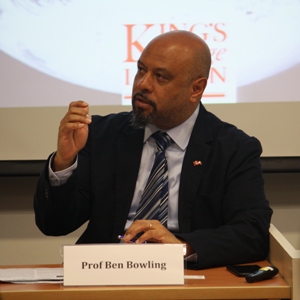Information
Venue
Start
End
Speaker(s)/Moderator(s)
30 March 2016 | Joint Seminar
This seminar was jointly organised by CIL and NUS Faculty of Law.
Global Policing and Transnational Law Enforcement
Introduction
 Policing is globalising. The tasks of enforcing the law, maintaining order, investigating crime and myriad other aspects of social control – which have historically been based almost exclusively within local communities – now stretch far beyond national boundaries. Many police and law enforcement officers spend their time communicating and collaborating with colleagues abroad. This might be in pursuit of a fugitive criminal, gathering witness statements and forensic evidence, tracing the proceeds of crime or assessing the threat of organised criminality. It could involve any of the countless problems to which the police are thought of as a solution. It might simply be making one of the 3.3 million Interpol database searches that happen every day. Some policing tasks – such as investigating drug trafficking or money laundering – are entirely concerned with intercontinental criminality. Policing borders, seas and cyberspace is intrinsically transnational. As international travel has grown, and as people, goods and services flow faster across borders, so transnational policing has developed in complexity and geographical extent. Policing, still rooted in locality, has become far better connected transnationally. The study of policing that transcends national boundaries is a vibrant and growing area of interest for scholars in a wide range of disciplines and among law enforcement officers themselves. This seminar explored the emerging organisational architecture of transnational policing and its constituent investigative, surveillant and enforcement practices. Examining law enforcement responses to cross-border problems and the policing of transnational spaces, this seminar raised questions about the effectiveness, legitimacy, accountability and control of borderless policing.
Policing is globalising. The tasks of enforcing the law, maintaining order, investigating crime and myriad other aspects of social control – which have historically been based almost exclusively within local communities – now stretch far beyond national boundaries. Many police and law enforcement officers spend their time communicating and collaborating with colleagues abroad. This might be in pursuit of a fugitive criminal, gathering witness statements and forensic evidence, tracing the proceeds of crime or assessing the threat of organised criminality. It could involve any of the countless problems to which the police are thought of as a solution. It might simply be making one of the 3.3 million Interpol database searches that happen every day. Some policing tasks – such as investigating drug trafficking or money laundering – are entirely concerned with intercontinental criminality. Policing borders, seas and cyberspace is intrinsically transnational. As international travel has grown, and as people, goods and services flow faster across borders, so transnational policing has developed in complexity and geographical extent. Policing, still rooted in locality, has become far better connected transnationally. The study of policing that transcends national boundaries is a vibrant and growing area of interest for scholars in a wide range of disciplines and among law enforcement officers themselves. This seminar explored the emerging organisational architecture of transnational policing and its constituent investigative, surveillant and enforcement practices. Examining law enforcement responses to cross-border problems and the policing of transnational spaces, this seminar raised questions about the effectiveness, legitimacy, accountability and control of borderless policing.
Presentation
To download Prof Bowling’s presentation in PDF format, click here.
About the Speaker
Ben Bowling is Acting Executive Dean and Professor of Criminology & Criminal Justice at the Dickson Poon School of Law, King’s College London. Prior to joining King’s as Lecturer in Law in 1999, Ben was Lecturer at the University of Cambridge Institute of Criminology, Assistant Professor at John Jay College of Criminal Justice (City University of New York) and Senior Research Officer in the Home Office. He has been a visiting professor at the University of the West Indies, at Monash University (Melbourne) and at the East China University of Political Science and Law (Shanghai).
Bowling’s research examines practical, political and legal problems in policing and the connections between local and global police power. His work exploring themes of fairness, effectiveness and accountability has been published in the Modern Law Review, Criminal Law Review and Theoretical Criminology and in recent books – Policing the Caribbean (Oxford University Press 2010), Global Policing (with James Sheptycki, Sage 2012), Stop & Search: Police Power in Global Context (edited with Leanne Weber, Routledge 2012) and the four volume Global Policing and Transnational Law Enforcement (with James Sheptycki, Sage 2015).
Bowling is a founding member of Stopwatch, a research-led charity that promotes fair, effective and accountable policing and has been an adviser to the UK Parliament, Foreign and Commonwealth Office, Equality and Human Rights Commission, Interpol and the United Nations. He was awarded the Radzinowicz Memorial Prize for the best article in the British Journal of Criminology in 1999 and was elected a Fellow the Academy of Social Sciences in 2005.


